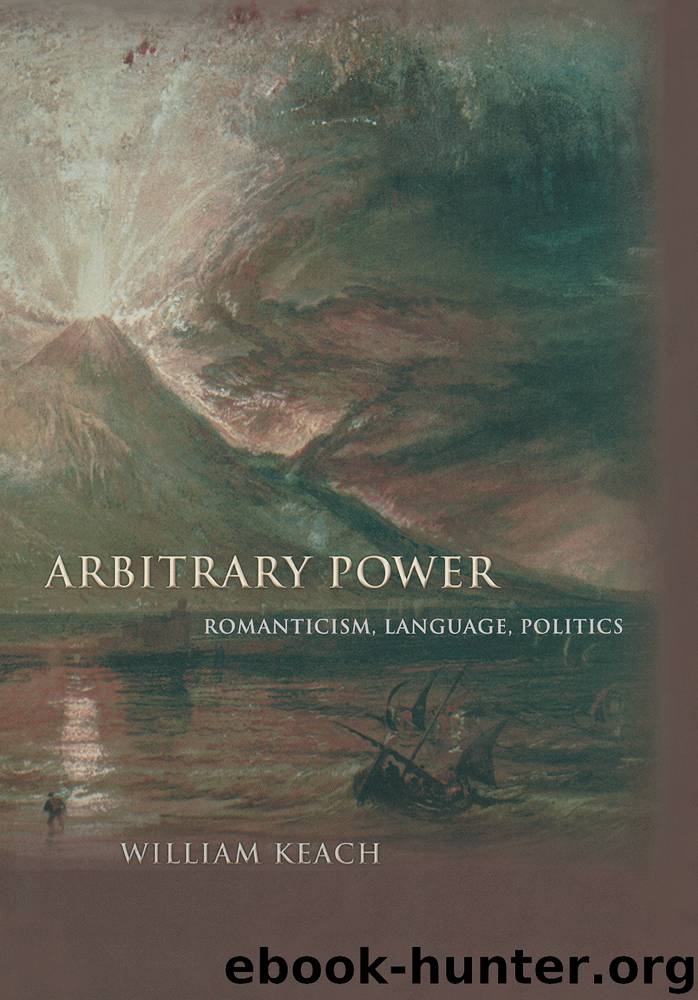Arbitrary Power by Keach William

Author:Keach, William.
Language: eng
Format: epub
Publisher: Princeton University Press
Published: 2015-04-14T16:00:00+00:00
5
“‘A SUBTLER LANGUAGE WITHIN LANGUAGE’”
1.
SHELLEY’S IMAGINING of a communicative engagement between men “whom education and a certain refinement of sentiment have placed above the use of vulgar idioms” meets, at its dramatic center and at its framing margin, the figure of a woman speaking. This figure elicits passion and madness as well as affectionate admiration—and silence: “I urged and questioned still, she told me how / All happened—but the cold world shall not know” (616–17). The gesture with which Julian and Maddalo closes is indicative of a larger pattern in Shelley’s writing, and in Romantic poetry more generally, having to do with representations of women’s discursive and political authority. My particular concern in this chapter is with the contradictions and limits of male feminism as it was historically constituted (at least incipiently) during the Romantic period—and the related but distinct issue of male writers imagining themselves as, or in the condition of, women. Such imaginings take on a fluctuating political significance in the wake of the French Revolution, when women acted, for a time at least, with unprecedented consequence and were followed—as in the march on Versailles in October 1789—by men dressed as women.1 They also situate questions about the “arbitrary imposition” of linguistic institution and use within a new set of social and psycholinguistic frames of reference.
My point of departure and of reference throughout much of the chapter is a remarkable moment from a Shelley poem that seems antithetical to Julian and Maddalo in its thematic and stylistic emphases. It is the scene of writing in Canto 7 of Laon and Cythna (or The Revolt of Islam, as the poem was retitled in its revised version), a scene set in an underwater cave where the revolutionary heroine Cythna has been isolated and imprisoned. At the center of this episode is Shelley’s representation of a woman transforming the conditions of solitary confinement into possibilities of liberation. From this representation emerges a series of interrelated questions. What does Cythna mean when she says “‘I resumed my ancient powers at length’” (7. 3075)? How are we to read the connection between her effort to communicate, through something like natural signs, with a sea-eagle who brings her food “‘By intercourse of mutual imagery / Of objects’” (7. 3087–88) and that assertively reflexive discursive exploration in which her own mind takes the place of the very cave where she is confined?
‘My mind became the book through which I grew
Wise in all human wisdom, and its cave,
Which like a mine I rifled through and through,
To me the keeping of its secrets gave—’
(7. 3100–103)
What does it mean for Cythna to extend such self-generated knowledge through writing that registers liberating transformations worked from within, rather than from outside or on the borders of, existing language—even as this writing recalls a literary tradition that makes it vulnerable to erasure by the waters of change and oblivion?
‘And on the sand would I make signs to range
These woofs, as they were woven, of my thought;
Clear, elemental shapes, whose smallest change
A subtler language within language wrought.
Download
This site does not store any files on its server. We only index and link to content provided by other sites. Please contact the content providers to delete copyright contents if any and email us, we'll remove relevant links or contents immediately.
Still Me by Jojo Moyes(11265)
On the Yard (New York Review Books Classics) by Braly Malcolm(5525)
A Year in the Merde by Stephen Clarke(5430)
Eleanor Oliphant Is Completely Fine by Gail Honeyman(5282)
The Bookshop by Penelope Fitzgerald(3852)
How Music Works by David Byrne(3270)
Surprise Me by Kinsella Sophie(3112)
Pharaoh by Wilbur Smith(2992)
Why I Write by George Orwell(2952)
A Column of Fire by Ken Follett(2612)
Churchill by Paul Johnson(2584)
The Beach by Alex Garland(2560)
The Songlines by Bruce Chatwin(2555)
Aubrey–Maturin 02 - [1803-04] - Post Captain by Patrick O'Brian(2306)
Heartless by Mary Balogh(2259)
Elizabeth by Philippa Jones(2205)
Hitler by Ian Kershaw(2197)
Life of Elizabeth I by Alison Weir(2086)
Harry Potter and the Cursed Child by J. K. Rowling & John Tiffany & Jack Thorne(2062)
